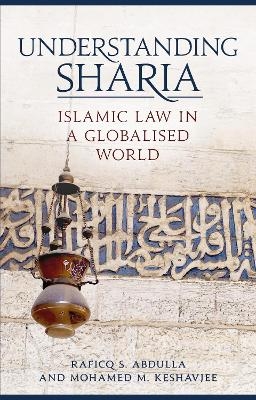
Understanding Sharia
I.B. Tauris in association with the Institute of Ismaili Studies (Verlag)
978-1-78831-319-3 (ISBN)
Sharia has been a source of misunderstanding and misconception in both the Muslim and non-Muslim worlds. Understanding Sharia: Islamic Law in a Globalised World sets out to explore the reality of sharia, contextualising its development in the early centuries of Islam and showing how it evolved in line with historical and social circumstances. The authors, Raficq S. Abdulla and Mohamed M. Keshavjee, both British-trained lawyers, argue that sharia and the positive law flowing from it, known as fiqh, have never been an exclusive legal system or a fixed set of beliefs.
In addition to tracing the history of sharia, the book offers a critique concerning its status today. Sharia is examined with regard to particular issues that are of paramount importance in the contemporary world, such as human rights; criminal penalties, including those dealing with apostasy, blasphemy and adultery, commercial transactions, and bio-medical ethics, amongst other subjects. The authors show that sharia is a legal system underpinned by ethical principles that are open to change in different circumstances and contexts, notwithstanding the claims for `transcendental permanence' made by Islamists. This book encourages new thinking about the history of sharia and its role in the modern world.
Raficq Abdulla is a South African-born lawyer, writer, public speaker and broadcaster who read Jurisprudence at Oxford. He was called to the Bar at the Middle Temple in the 1960s. He is currently a Visiting Fellow of the Faculty of Business and Law, Kingston University. He is also a founder member of the Advisory Panel of the Muslim Law Shariah Council (United Kingdom). He is a trustee of the Poetry Society, Planet Poetry and of PEN. In 1999, he was awarded an MBE for his interfaith work among Muslims, Jews, and Christians. Mohamed Keshavjee is a South African born-lawyer called to the Bar at Gray's Inn in 1969. He completed his LLM at London University and his PhD at SOAS with a focus on Islamic Law and Alternative Dispute Resolution (ADR). He has practised law in Kenya, Canada and the United Kingdom. His first book, Islam, Sharia and Alternative Dispute Resolution deals with how Muslims engage with sharia, customary practices and the laws of the United Kingdom. He has spoken on ADR at conferences in Europe, North America and Asia, and has trained family mediators in the EU countries and imams and pastors in mosque and church conflicts in the UK and the USA, respectively. In 2016, he was awarded the "Gandhi, King, Ikeda Peace Award" at the Martin Luther King Jr. International Chapel, Morehouse College in Atlanta, Georgia, for his work on peace and human rights education.
Preface and Acknowledgements
Introduction: Islamic Law in the Contemporary World.
Chapter 1: Sharia - Origin through Revelation, Historical Development and Change.
Chapter 2: Legal Practice under the Umayyads
Chapter 3: Consolidation of the Schools of Law under the Abbasids
Chapter 4: Developments after Shafi?i
Chapter 5: Further Geographical Expansion and Cultural Accommodation
Chapter 6: Call for Reform - from Tanzimat to the Arab Spring
Chapter 7: Shi?i Legal Understanding and Theory of Law
Chapter 8: The Multiple Manifestations of Sharia
Chapter 9: Neo-Ijtihad
Chapter 10: Sharia and Human Rights
Chapter 11: Criminal Justice in Islam
Chapter 12: Islam and Ethics
Chapter 13: Critique
Appendix
Schools of Law in Islam (madhahib)
Glossary
Index
Bibliography
Index
| Erscheinungsdatum | 08.08.2018 |
|---|---|
| Sprache | englisch |
| Maße | 138 x 216 mm |
| Themenwelt | Geschichte ► Teilgebiete der Geschichte ► Religionsgeschichte |
| Geisteswissenschaften ► Religion / Theologie ► Islam | |
| Recht / Steuern ► Allgemeines / Lexika | |
| Recht / Steuern ► EU / Internationales Recht | |
| ISBN-10 | 1-78831-319-4 / 1788313194 |
| ISBN-13 | 978-1-78831-319-3 / 9781788313193 |
| Zustand | Neuware |
| Haben Sie eine Frage zum Produkt? |
aus dem Bereich


